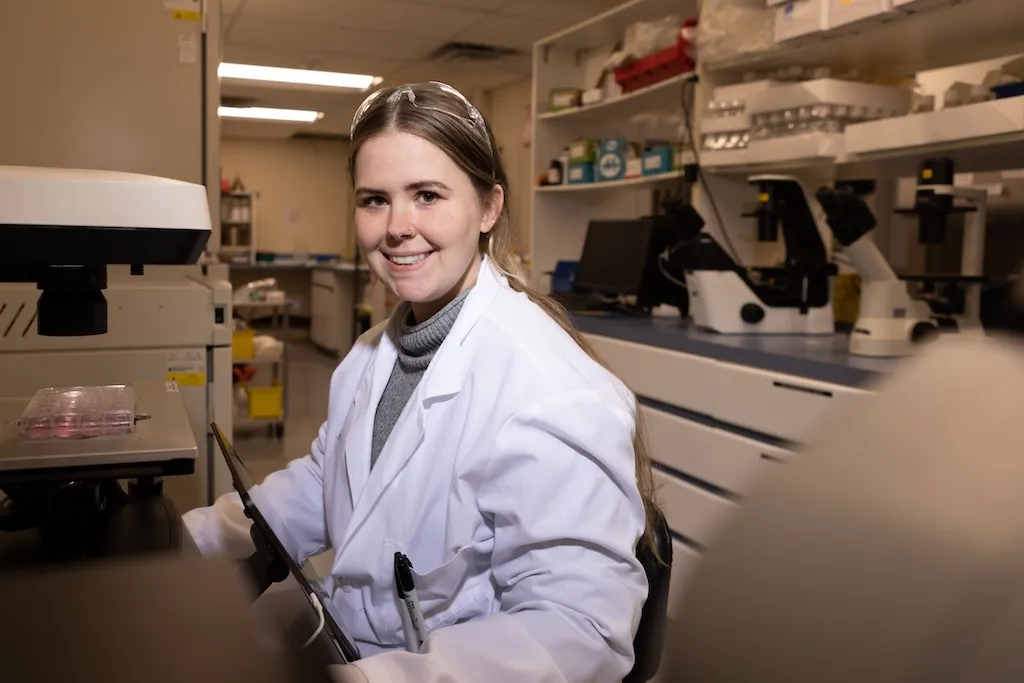Prepare for an exciting career in this cutting-edge scientific field.
The Master of Science in Biotechnology program at Worcester State University will help you broaden your understanding of the biological sciences and prepare you for a career or doctoral program in the growing field of biotechnology.
With classes available in the late afternoons and evenings, this flexible, part-time program is designed with working students like you in mind. The program offers the possibility of transferring up to 12 eligible credits of graduate work—also making it a great value. Worcester State also offers a 4-Plus option for our current undergraduate biotechnology major that enables the undergraduate and graduate degree requirements to be completed in 5 years.
Worcester State’s biotechnology curriculum covers a wide range of topics in biology and chemistry, and some courses include a hands-on laboratory component, through which you will put classroom theory into practice. Moreover, you will have exciting opportunities to conduct research with our accomplished faculty or with other experienced scientists in the field. You will demonstrate your mastery of program coursework by completing a research project and writing a thesis—and passing a written and/or oral examination when you defend your thesis.
While many of our students have continued their studies beyond the master’s level, others have found success in an array of laboratory settings in education, industry, research, and manufacturing. In fact, some of our recent graduates are employed by Worcester-area colleges and universities, and most are at various biotechnology companies. As a program graduate, you will gain all the advantages that come with being part of our network of biotechnology professionals.
-
Applicants for this program must provide the following:
- Proof of a bachelor’s degree in biology, biotechnology, chemistry, or a similar science major, from a regionally accredited institution, or from a recognized foreign institution of higher education, with a minimum 2.75 overall GPA, and 3.00 in all coursework within their major and in the ancillary courses.
- Completed graduate application, including fee and essay
- Official transcripts (Official Course-by-Course transcript evaluation required for all college level courses taken outside of the United States.)
- Two current letters of recommendation (Less than 6 months old)
- Results of an English proficiency assessment, if applicable
- Proof of successful completion of Chemistry I and II, Organic Chemistry I, Physics I and II, Microbiology, Cell and/or Molecular Biology (all with a laboratory component), Organic Chemistry II lecture course (no lab requirement), and math coursework up to the level of pre-calculus
- Graduate Record Exam (GRE) scores
-
This is an example of the WYSIWYG content type Heading
The program of study includes 35 graduate credits in required and elective courses, research in biology/biotechnology culminating in an acceptable written thesis and thesis defense.
Of the 35 credits required for the degree, at least 22 credits must be earned as a matriculated graduate student at Worcester State University. Credits for which students have earned a B- or higher within a 2-year period immediately prior to the date of their acceptance into the program are transferable from an accredited institution, including credits earned at Worcester State University. A maximum of 12 such transfer credits may be accepted. Matriculated students who do not maintain a GPA 3.0 or higher or have 2 grades below a B- will be terminated from the program. All work for the degree must be completed within a period of 6 years from the date of admission to the program.
To fulfill requirements for the program the candidate must complete 9 credits of thesis research and writing coursework (BI-996, BI-997, and BI-998). Laboratory investigations are supervised by faculty in the laboratories at Worcester State University or by arrangement at another institution. The candidate must adhere to the form specified for the thesis by the Biology Department graduate faculty. The thesis will be defended in an oral examination conducted by the faculty.
During the semester in which the candidate anticipates receiving the degree, the following timetable for the thesis completion and defense shall apply:
A minimum of 4 weeks prior to the defense, the completed written thesis must be presented to the candidate’s graduate research advisor. The comprehensive exam/thesis defense will be scheduled with the candidate’s thesis committee, comprising the thesis advisor, the program coordinator, and another member of the program graduate faculty.
A minimum of 2 weeks prior to the defense, the final copy of the thesis, with approval by the candidate’s graduate research advisor, will be submitted to the members of the candidate’s thesis committee.
Comprehensive Examination/Thesis defense
The Master of Science in Biotechnology candidate is required to pass a comprehensive examination/thesis defense in the candidate’s area of specialization. At least 24 approved graduate credits must be earned before the candidate can submit a request for the scheduling of a comprehensive exam/thesis defense. If the candidate fails the examination, he/she will be granted one additional opportunity to fulfill this requirement. All work for the degree must be completed within a period of 6 years from the date of admission to the program.
Explore sample courses in the Master of Science in Biotechnology -
-
-
-
-
-
-
-
-
-
-
-
-
-
BI-915 Topics in Advanced Botany
BI-921 Biotechnology and DNA
BI-923 Fermentation Technology
BI-927 Tissue Culture Techniques
BI-930 Biological Chemistry
BI-935 Biochemical Techniques
BI-936 Immunology
BI-937 Molecular Virology
BI-938 Toxicology
BI-942 Biostatistical Analysis
BI-943 Experimental Design
BI-950 Physiological Ecology
BI-960 Biology of Symbiosis
BT-901 Directed Study: Biotechnology


